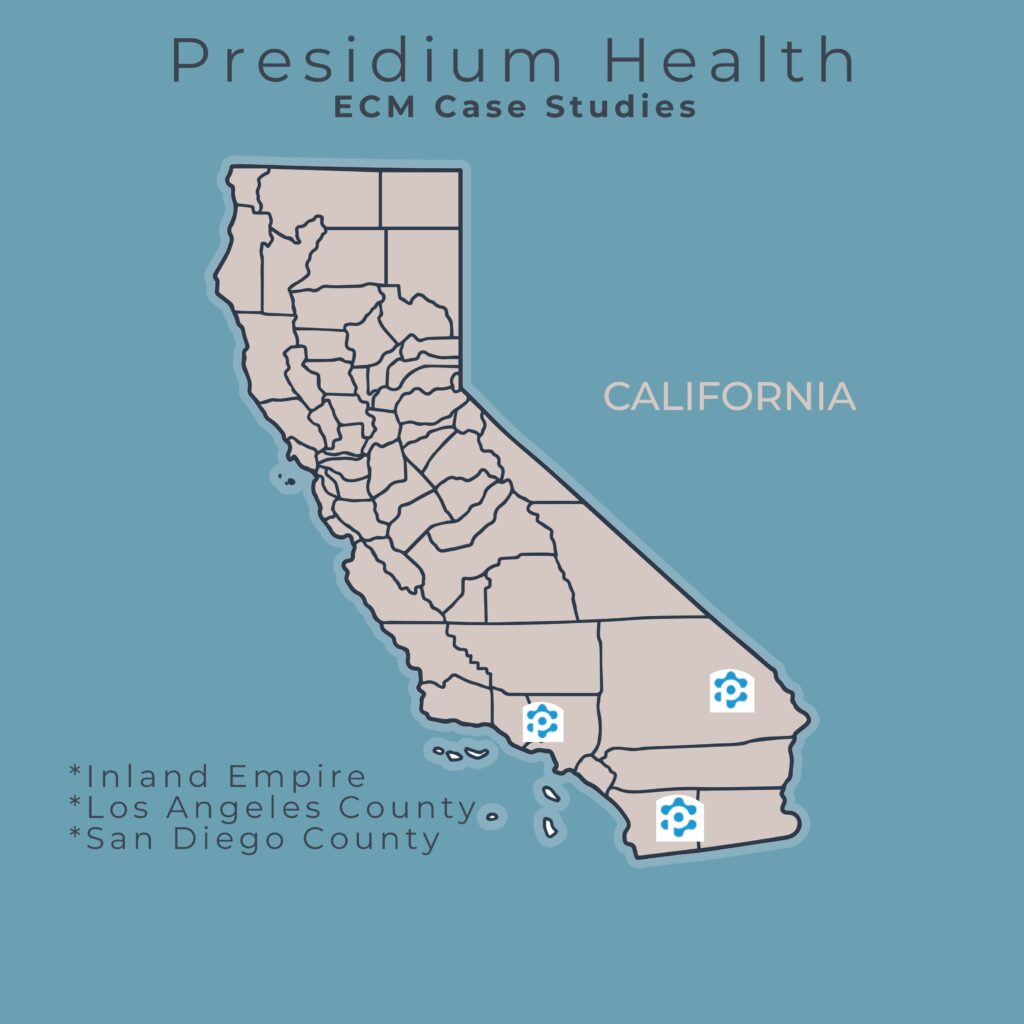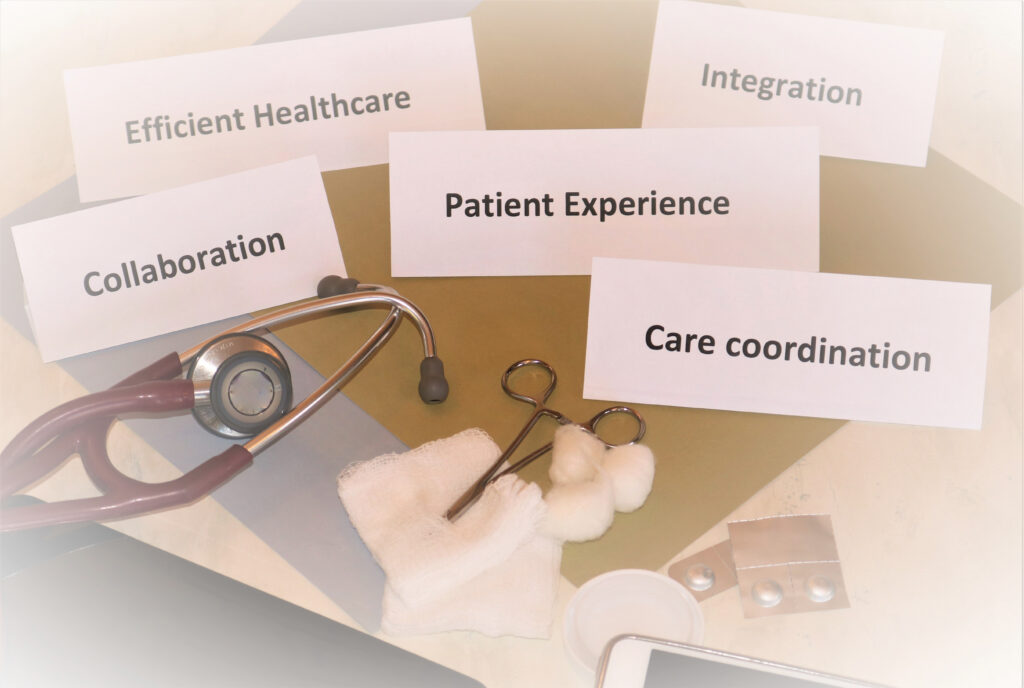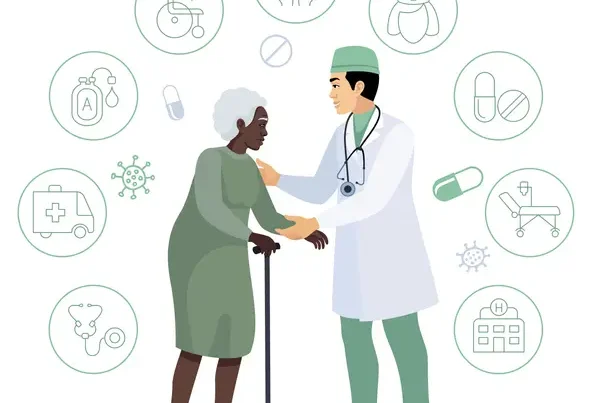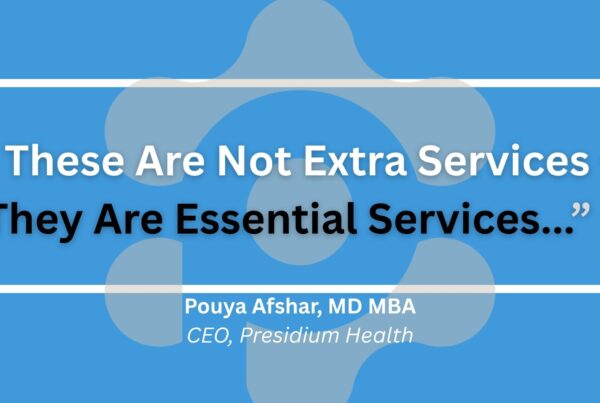Enhanced care management (ECM) is more than just coordination; it’s personalized support tailored to some of the most vulnerable individuals. Read more about Presidium’s complete overview of Enhanced Care Management. At Presidium Health, this isn’t just a philosophy—it’s our dedicated mission to transform lives; ECM is a productive tool in that aim for qualified members. By addressing medical, behavioral, and social challenges, Presidium’s ECM services empower eligible members with the tools to regain stability and improve outcomes. With real-life examples as evidence, like B.L. and F.T., Presidium Health’s Enhanced Care Management model bridges gaps that traditional systems often overlook, offering meaningful change to patients, health plans and communities alike.
Understanding the Enhanced Care Management Model

ECM, by targeting both medical and social determinants of health, aims to fill critical gaps in Californian’s health care. It isn’t just about treating an illness— ECM providers treat the whole person. Presidium’s ECM model takes this whole person care philosophy to heart, offering targeted, structured interventions to improve outcomes.
What Is Enhanced Care Management?
At its core, an ECM program provides personalized, hands-on coordination for individuals navigating healthcare challenges. It connects the population of focus with the resources they need while fostering strong relationships with providers. The goal? Delivery systems that empower patients to take charge of their health and lives, no matter how overwhelming their situation might be.
This type of care prioritizes proactive support for people dealing with chronic health conditions, mental illness or health concerns, or social issues like housing insecurity. By focusing on the individual as a whole, it ensures that no aspect of their well-being goes overlooked. For example, services like transportation to appointments, assistance with food security, and mental health therapy sessions are integral to this approach.
For a deeper dive, explore more about how the core ECM benefits for members play out.
Why Does It Matter?
Modern healthcare often overlooks the barriers patients face in accessing basic care services. Presidium Health’s Enhanced care management model works to remove those barriers which confine the traditional walls of health care. It’s especially crucial for vulnerable populations who may not have the means to navigate the complexities of the healthcare system alone. But beyond logistics, this approach fosters trust—a key ingredient in improving both health outcomes and quality of life.
When you consider someone struggling with both chronic pain and homelessness, it becomes clear: managing their condition is as much about addressing their social needs as it is about medical care. Programs like ECM reinforce why compassion and pragmatic solutions should sit at the center of the care plan.
Addressing Challenges Through Enhanced Care Management
ECM bridges gaps that traditional systems often overlook. The unique focus combines efforts like:
- Connecting patients with essential resources, from housing services to food banks.
- Coordinating care between providers, ensuring nothing falls through the cracks.
- Offering hands-on assistance, like transportation and appointment scheduling.
Check out our White Paper on Presidium Tips to Success within the ECM provider success strategies.
Enhanced Care Management in Practice
Real-world examples show how this approach transforms lives. Patients like B.L., who moved into a safer assisted nursing facility, and F.T., who received support while living in her car, demonstrate the tangible benefits. They’re proof that Presidium Health’s enhanced care management model isn’t just a program—it’s a lifeline. It meets people where they are and ensures they don’t face their challenges alone.
For ongoing insights into how this model of care continues to evolve, explore more about the CalAIM framework shaping these ECM models.

Case Study Overview: B.L.
Understanding the challenges and tailored support provided to B.L. sheds light on the impact of Presidium Health’s ECM model. Her case highlights how personalized interventions address health, behavior, and social barriers. Let’s break down her journey.
A 60 Year-Old With Hypertension and COPD
B.L. faced significant health challenges, primarily hypertension and COPD (Chronic Obstructive Pulmonary Disease). These chronic conditions required additional needs like consistent monitoring and care, but B.L. previously lacked consistent engagement with her primary care provider. The persistent nature of her COPD symptoms, including a chronic cough, underscored the need for timely pulmonology referrals and comprehensive treatment strategies. With enhanced care management, her healthcare journey was transformed as she began attending primary care visits more frequently, ensuring her conditions were managed more proactively.
Life Quality Impacted By Depression and Schizophrenia
Behavioral health played a substantial role in B.L.’s daily life. Her struggles with depression, schizophrenia, and trauma (after surviving a natural disaster) compounded her challenges. These mental health issues not only contributed to emotional distress but also complicated her ability to follow medical regimens and address her physical health concerns. Enhanced care management introduced regular therapy and medication compliance, helping to stabilize her mental well-being. Programs such as Telephone Angels, which reduce loneliness, were explored to further address her emotional needs and build a supportive environment.
Precarious Social Circumstances
B.L.’s life stability was further challenged by precarious social circumstances. Living in Board and Care housing, she faced the stress of potential displacement. She also struggled with reliable transportation, which affected her ability to access necessary medical appointments and community resources. These barriers impacted her overall quality of life, affecting both her physical and mental health. Enhanced care management provided solutions such as securing assisted living arrangements, scheduling transportation for appointments, and facilitating access to essential services like food and hygiene supplies.
Interventions Implemented
Through Presidium Health’s ECM model, several interventions were implemented for B.L. by her lead care manager, addressing her unique needs.
- Mental Health Support: Monthly therapy sessions were arranged, paired with medication adherence monitoring, ensuring consistent behavioral health improvements.
- Housing Stability: Coordination efforts secured a transition from Board and Care to a new assisted living facility, aiming for long-term security.
- Medical Care Coordination: Advocacy increased the frequency of her primary care visits from every three months to every 2-3 weeks. This change created stronger collaboration between B.L. and her care provider.
- Transportation Assistance: Transportation was arranged not only for medical visits but also for community food resources, ensuring both healthcare and basic needs were met.
Outcomes of Care
The outcomes of the interventions demonstrated the profound impact of ECM on B.L.’s life. Her mental health stabilized with regular therapy and consistent use of prescribed medication. She transitioned to a new, safer assisted living facility, alleviating the stress of housing instability. Access to reliable transportation enabled her to attend appointments and community programs, reducing the barriers she once faced. Additionally, the care coordinator’s efforts ensured her primary care team addressed her concerns, establishing a stronger patient-provider relationship.
B.L.’s case exemplifies the power of holistic, personalized care in enhancing patient outcomes, proving that no challenge is insurmountable with the right support system in place.
Case Study Overview: F.T.
F.T. is a testament to how personalized enhanced care management can profoundly improve lives. Confronted with a range of social, medical, and emotional struggles, her journey demonstrates the value of comprehensive support. ECM provided her with the foundational tools and guidance she needed to regain stability and independence.
A 59 Year Old With Hypertension and Arthritis
F.T. faced the challenges of managing hypertension and arthritis. Both conditions required consistent monitoring to prevent complications, yet her unstable living conditions made access to care challenging. Her arthritis, particularly pronounced in her right hand, caused chronic pain and inflammation, directly impacting her day-to-day life. Presidium Health bridged the gap by ensuring she had access to the specialists she needed, such as a rheumatologist, while coordinating critical follow-ups and facilitating pain management discussions.
A Traumatic Past Suppressed
Beyond her physical health, F.T. struggled with profound depression and PTSD. These behavioral health challenges stemmed from past experiences, including domestic violence. Mental health can be one of the hardest barriers to overcome, especially when compounded by grief, such as the loss of her friend during her enrollment period. Initially hesitant to seek support, she eventually started therapy at an outpatient clinic, which provided a safe space to process her trauma. This marked a turning point in her healing journey and highlighted the importance of persistence in care coordination.
A Gal and Her Pal
F.T.’s living situation was fraught with challenges. She resided in her car, accompanied by her loyal pet, which she refused to abandon even during her hardest times. This presented unique barriers, such as the difficulty in finding housing solutions that could accommodate a pet or ensuring her safety while parked overnight. Despite these obstacles, enhanced care management worked to locate safe parking sites and prioritize solutions that preserved the bond between F.T. and her pet. Her case exemplifies the critical intersection of compassion and pragmatism in care delivery.
Interventions Implemented
The care team implemented several targeted interventions to address F.T.’s complex needs:
- Housing Navigation: Ensured she received guidance on safe parking programs, ultimately connecting her to a secure site in Los Angeles.
- Specialized Referrals: Advocated for and secured appointments with key specialists, including rheumatology and cardiology services.
- Employment Support: When F.T. expressed a desire for employment, her care coordinator helped her secure work as a caregiver, even providing scrubs and shoes for her new role.
- Fitness Resources: Addressed her interest in mobility and activity by exploring fitness memberships and exercise opportunities.
From arranging transportation to ensuring she maintained her medical appointments, these interventions aimed to remove as many barriers as possible.
Outcomes Achieved
The impact of Presidium ‘s ECM model on F.T.’s life became apparent through tangible improvements. With housing navigation services, she found safer environments to park and rest, bringing a sense of security for her and her pet. Access to medical specialists alleviated her physical discomforts, while outpatient therapy sessions helped her address emotional trauma. Additionally, her newfound employment brought a sense of purpose and financial stability, empowering her to look toward the future.
F.T.’s case showcases the transformative potential of enhanced care management. By addressing her challenges holistically—medical, behavioral, and social—the program gave her the tools she needed to rebuild her life step by step.
Key Benefits of Enhanced Care Management

Enhanced care management has transformed healthcare for Californians facing medical and social barriers. This comprehensive care management approach addresses the full spectrum of a patient’s needs, ensuring that no aspect of their health or life is overlooked. Whether it’s housing support, mental health services, or help accessing medical care, ECM puts solutions within reach. Below, we’ll explore how these benefits reshape lives, enable better outcomes, and improve healthcare delivery.
Improved Health Outcomes
ECM is designed to tackle the root causes of health challenges. By addressing both medical and social factors, it enables patients to take control of their health. This approach ensures proactive care rather than reactive treatment.
- Chronic Conditions Managed Proactively: Coordinators work closely with patients to ensure regular check-ins, timely referrals, and medication adherence. This reduces hospital visits and prevents complications.
- Whole-Person Care: Combining mental and physical health support leads to balanced outcomes. For example, therapy for trauma-related depression is as important as managing hypertension.
Personalization and Patient-Centered Care
Patients enrolled in Presidium Health’s enhanced care management programs experience care tailored specifically to their needs. This isn’t a one-size-fits-all model—it’s as unique as the people it serves.
- Individualized Plans: Every patient has a personalized care roadmap, ensuring their specific goals are met.
- Holistic Approach: From arranging transportation for doctor’s appointments to securing housing, enhanced care management sees the patient as a whole person, not just a medical diagnosis.
For more on Presidium Health’s tailored solutions requiring more intensive coordination of health, explore Hospital at Home care benefits.
Strengthened Provider Collaboration
In traditional healthcare, care coordination often falls through the cracks. ECM eliminates these gaps, ensuring providers work together seamlessly to meet patients’ needs.
- Smooth Care Transitions: Better handoffs between specialists, primary care doctors, and other support networks reduce patient stress.
- Centralized Care Coordination: A dedicated team helps patients navigate the healthcare maze, saving time and energy.
Enhanced Access to Resources
For individuals unable to navigate essential services independently, enhanced care management is life-changing. This approach ensures patients are equipped with the tools they need to succeed in their care journeys.
- Transportation Assistance: Getting to appointments is no longer a barrier.
- Social Services Integration: Coordinators connect patients with resources like food banks, housing services, and fitness programs.
California’s Medi-Cal program offers an excellent example of enhanced care management’s role in improving access for high-need populations. Learn more on the official California DHCS page.
Reduced Cost of Care
Investing in enhanced care management often leads to lower healthcare costs in the long run. By preventing avoidable emergency visits and hospitalizations, this model saves money while improving outcomes.
- Fewer Emergency Visits: Proactive management reduces health crises.
- Sustainable Care Models: Patients learn how to manage their conditions independently over time.
ECM isn’t just about meeting immediate needs—it’s about fostering independence, promoting self-management, and ensuring long-term health stability. For patients and providers alike, it presents a win-win opportunity that redefines what quality care looks like.
What Are The Challenges in Enhanced Care Management?

ECM holds the promise of radically transforming healthcare, particularly for vulnerable populations. Yet, like any innovative approach, it comes with its own set of challenges. From developing a robust workforce to managing the complexities of resource allocation, overcoming these obstacles is essential to delivering effective care.
Workforce Development: The Need for Trained Professionals in Enhanced Care Management
The backbone of ECM rests on the professionals delivering it. Without a skilled and dedicated workforce, the program cannot achieve its full potential. However, finding and retaining staff with the right mix of medical expertise and empathy demands focused attention.
- Recruitment Issues: Many healthcare organizations struggle to hire professionals equipped for the varied demands of enhanced care management. Challenges include insufficient training programs and competition for qualified professionals in an already strained labor market.
- Burnout Among Staff: Those who join these roles often face high caseloads, extensive documentation requirements, and emotional strain. Burnout is a real concern, threatening both the well-being of care providers and the quality of care delivered.
To mitigate these challenges, investing in robust training frameworks is key. Comprehensive onboarding programs, ongoing professional development opportunities, and clear career pathways can enhance recruitment and retention efforts. This isn’t just a nice-to-have—it’s essential. Building strong teams can dramatically improve patient outcomes and reduce turnover rates. For more insights into what it takes to support healthcare teams effectively, see how Presidium Health addresses ECM program workforce challenges in enhanced care initiatives.
Resource Allocation: The Funding and Distribution Dilemma
Enhanced care management is resource-intensive. Coordinators must balance medical, social, and logistical needs while navigating significant financial and operational hurdles. Unfortunately, inequitable funding often compromises the program’s reach.
- Funding Gaps: Budgets don’t always align with the complexity of patient needs. Insufficient funding limits services, leading to inconsistent care delivery.
- Disparities in Resource Access: Services like housing assistance or mental health support might be robust in urban areas but sparse in rural regions. This uneven distribution creates disparities in care quality.
Solving the resource puzzle requires innovative thinking. Allocating funds more strategically and fostering partnerships with community organizations can extend the impact of enhanced care management. For example, California’s CalAIM initiative aims to tackle these resource challenges by emphasizing holistic care while addressing social determinants of health. Learn more about the ongoing efforts in California’s ECM Action Plan.
As advanced care models evolve, tackling workforce shortages and resource limitations will remain crucial. By addressing these barriers head-on, healthcare systems can realize the transformative potential of enhanced care management.
Conclusion
Presidium Health’s Enhanced care management model is revolutionizing how healthcare is delivered in California, especially for those with the greatest needs. By addressing the full scope of patient challenges—through medical, social, and behavioral interventions—it provides a foundation for real, lasting improvements in health and quality of life.
Bridging the Gap Between Medical and Social Care
For individuals like B.L. and F.T., enhanced care management serves as a lifeline, closing the gaps between healthcare services and everyday needs. This model goes beyond clinical care by offering solutions for issues like housing insecurity, food access, and emotional well-being. It’s not just about fixing problems; it’s about empowering individuals to regain control and thrive.
Real-Life Stories Highlight the Potential
The outcomes from case studies like those of B.L. and F.T. are reminders of this program’s tangible impact:
- B.L. gained a stable living environment, improved access to primary and specialized care, and mental health stabilization.
- F.T. transitioned from living in her car into safer conditions, received needed medical attention, and found meaningful employment.
These aren’t just success stories—they’re proof points of how enhanced care management can provide solutions where traditional methods fall short. If you’re curious about the foundation behind workforce readiness in these programs, explore Developing the ECM Workforce.
Collaboration and Personalization Are the Keys
The program’s success lies in collaboration. By fostering relationships between care providers, patients, and community resources, it creates a comprehensive support system. Patients aren’t seen as cases to manage but as individuals whose journeys matter. Personalized interventions ensure that every person gets the help they truly need, whether that’s coordinating transportation, securing housing, or arranging therapy.
Enhancing Lives, One Step at a Time
While challenges like workforce development and resource allocation remain, programs are steadily adapting to meet these hurdles head-on. The goal is simple yet profound: to integrate compassion and strategy to uplift those who need it most. Presidium Health’s Enhanced care management model holds the potential to redefine healthcare, ensuring that no one is left behind.
Stay updated with Presidium Health’s latest initiatives and explore categorized insights on central resource on Enhanced Care Management.




